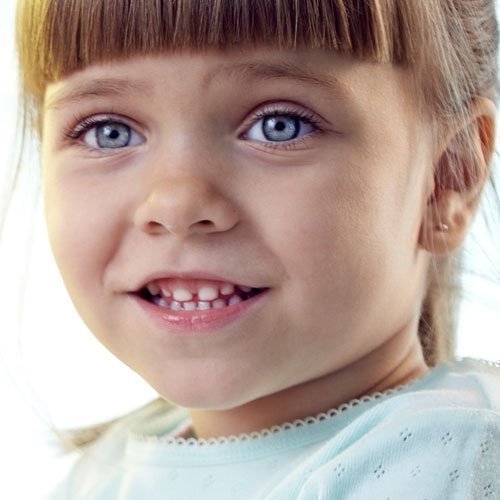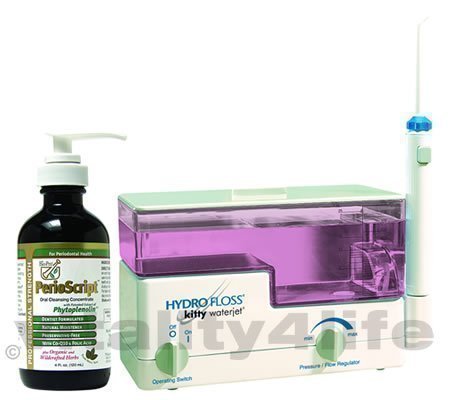Vitality 4 Life uses cookies to provide and improve our services, if you continue browsing, we consider that you accept its use. For more information, please see our privacy page.

Child Oral Health
Cavity prevention is not the only concern parents should have when considering their children’s oral health. Recent studies show that periodontal disease continues to plague millions of Americans, including children. The best way to ensure that your child does not get cavities or gingivitis is to instill proper oral habits early. Good oral hygiene routines should be established as early as infancy and continued throughout life.
When do teeth appear?
Teeth begin to erupt at about six months of age. The tooth appears first and the root begins to develop underneath. When a child’s mouth is fully developed there should be 20 teeth—10 on the bottom and 10 on the top. However, the top and bottom teeth erupt at different times.
Top: The central incisors, or very front teeth, are the first to erupt between 6 to 12 months. The teeth next to them, called the lateral incisors, erupt between 9 to 13 months. The canines erupt between 16 to 22 months. The fist molars erupt between 13 to 19 months. And the second molars erupt between 25 to 33 months.
Bottom: The central incisors erupt between 6 to 10 months. The lateral incisors erupt between 10 to 16 months. The canines erupt between 17 to 23 months. The first molars erupt between 14 to 18 months. The second molars erupt between 23 to 31 months. Under all this activity, the 32 adult teeth are forming. In fact, the adult teeth began developing when the baby was three months old.
At what age should my child visit the dentist?
Children should visit the dentist for the first time between the ages of six months to one year. Do not wait for the child to be in pain to bring him or her to the dentist. Most procedures are painfree and your child should know that a trip to the dentist can be a comfortable and fun experience. Regular brushing should become a part of a child’s daily routine as soon as he or she can hold a brush. Parents should also swab infant’s gums to prevent plaque buildup. Children’s teeth should be brushed as soon as they erupt. Although the enamel of a child’s tooth is stronger than that of an adult, it is also thinner, so cavities develop more quickly. Children’s primary teeth require as much care as their permanent teeth. Untreated cavities in primary teeth can adversely affect the development of permanent teeth. Such cavities result in a roughening of adult teeth, or may result in primary teeth that erupt with cavities.
Are “baby” teeth important?
Your child’s primary teeth are extremely important. Without them your child cannot chew food properly and will have difficulty learning to speak clearly. Children who lose their primary teeth too soon require a space maintainer until their permanent teeth erupt. Otherwise, the teeth will tilt toward the empty space, causing the permanent teeth to come in crooked.
When do children lose their teeth?
The permanent teeth do not erupt until the child is almost 8 years of age. They continue to erupt until the child is about 13 years of age. Girl’s teeth tend to erupt a little earlier than boys’. The only teeth to appear after that are third molars, or wisdom teeth. They usually form between the ages of 12 to 16 and do not erupt until 17 to 20 years of age.
How can I help my child prevent cavities?
Children are the most cavity-prone of all age groups. It is critical that children brush twice each day and floss once each day to remove plaque, the colorless film of bacteria that forms on teeth and leads to decay and gum disease. A well-balanced diet and limited snacking also promote good oral health. Toothpaste and mouth rinses provide important protection. And, of course, regular dental check-ups are important.
When and how often should my child brush their teeth?
Dentists recommend brushing at least twice a day –after breakfast and before bedtime.
How often should my child visit the dentist?
Most children need appointments every six months. However, children who are experiencing cavities or other dental problems may need to see the dentist more frequently.

Hydrofloss Oral Irrigator
Hydro Floss cleans between teeth and deep into gum pockets, removing debris, plaque and other unwanted material which contributes to tooth decay, gum disease and bad breath. This is done with a technique called 'hydro magnetics', which actually inhibits bacteria from adhering to the tooth surface.

Perioscript Solution for Hydrofloss
All-natural professional strength deep-cleaning solution specifically developed for use in dental oral irrigators. Used in conjunction with an oral irrigator, you should see a significant change to the condition of unhealthy gums in a short period.











